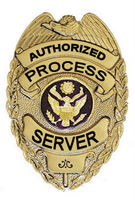What’s A Process Server And What Do They Do?
 A registered process server is an individual that is approved and licensed to deliver (serve) legal papers to people and businesses, known as defendants or parties. When a criminal or civil case goes to court, the attorneys notify the parties included through legal papers.
A registered process server is an individual that is approved and licensed to deliver (serve) legal papers to people and businesses, known as defendants or parties. When a criminal or civil case goes to court, the attorneys notify the parties included through legal papers.
The process server, upon obtaining the documents from the lawyer, proceeds to deliver the papers to the defendants. When we refer to registered process servers, these are normally servers that are licensed to serve within a certain county or area of their state, having been qualified to do so.
Coming to be a process server can be a simple process. The majority of states ask for an individual to be trained and certified by either a lawyer or an accepted professional server. Each state has a process server association or state board that governs the laws or process for that state.
They should additionally pass a listing of accepted exercises and courses. State laws and procedures will dictate the level of background overview one would need in order to serve documents.
The primary obligation of a process server is to provide notices of a pending case to the party or parties included. Process servers can additionally be asked to perform various other jobs related to process service, such as surveillance or carrying out background checks. It is up to the server to determine if they supply these services.
Cases vary and the lawyers representing each side will furnish the person’s identity and address where they believe they can be located for delivery. After the case has actually been filed in its respective court, the lawyers involved will deliver a court copy of the case with the parties to be notified to the server. The server then delivers the notification to the individual they are directed to. Depending on the kind of case, certain timelines will need to be followed.
Citations and requests tend to be routine and allow up to a couple of months to locate and serve the papers. Subpoenas to affirm and produce documents generally have a smaller sized time frame for completed delivery. Writs of garnishment and temporary restraining orders generally demand delivery within three business days due to the short-term nature of these types of cases.
If you are interested in becoming a registered process server, discover the requirements for your state and begin studying the laws of civil procedure. Serving legal documents is not the most attractive job, however it is always in demand and filings of new civil cases continue to expand every year.
